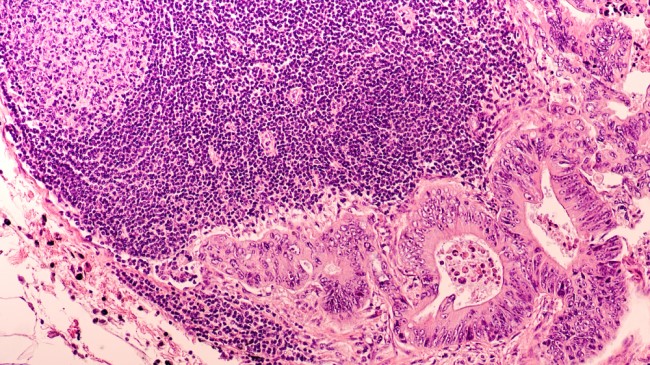UofG researchers partner with Nucleai to pioneer precision medicine for colorectal cancer
Published: 12 November 2025
Researchers at the University of Glasgow’s School of Cancer Sciences are partnering with Nucleai, a leader in AI-powered spatial biology for precision medicine, to identify and validate predictive biomarkers for colorectal cancer and advanced polyp incidence
Researchers at the University of Glasgow’s School of Cancer Sciences are partnering with Nucleai, a leader in AI-powered spatial biology for precision medicine, to identify and validate predictive biomarkers for colorectal cancer and advanced polyp incidence.
The project leverages artificial intelligence and multimodal spatial biology data, combining tissue, molecular and clinical data to improve our understanding of patient risk and aid early detection.

The collaboration will analyse data from the University of Glasgow-led INCISE (Integrated Technologies for Improved Polyp Surveillance) study – one of the world’s most comprehensive and unique colon precancerous polyp cohorts – to uncover how tissue architecture, cell-to-cell interactions, and molecular signalling influence cancer progression. These insights will lay the foundation for clinically validated precision diagnostic products, designed to predict disease risk and personalize surveillance strategies.
Harnessing AI and Multimodal Data to Predict and Prevent Colorectal Cancer
Colorectal cancer remains one of the most preventable yet deadly cancers, with outcomes heavily dependent on early detection and accurate risk assessment. Current surveillance programs often suffer from overuse and limited precision, leading to unnecessary procedures and missed opportunities for cancer detection and prevention.
The collaboration combines the University of Glasgow’s clinical and pathology excellence with Nucleai’s scalable multimodal spatial pipeline, the most advanced in the world for spatial proteomics and tissue-level AI analysis. This pipeline integrates multiplex immunofluorescence (mIF), IHC, H&E, and clinical data in an automated, AI-driven workflow, enabling biomarker discovery and validation at unprecedented scale and accuracy.
Joanne Edwards, Professor of Translational Cancer Pathology, University of Glasgow, added: “The INCISE study represents a transformative opportunity to understand colorectal cancer at a systems level. By integrating spatial biology with clinical data, we’re uncovering the hidden architecture of disease progression.
“This partnership with Nucleai allows us to translate these insights into predictive tools that can truly personalize surveillance and prevention strategies – bringing precision medicine into routine care.”
Nucleai’s approach uniquely integrates high dimensionality multimodal data for biomarker discovery and applies complexity reduction techniques to translate those discoveries into scalable diagnostic tests. This strategy bridges the gap between advanced discovery science and real-world clinical deployment – enabling broad accessibility without compromising biological depth. Unlike approaches based solely on low-complexity or H&E data, Nucleai’s platform captures the full biological context of disease, yielding more predictive and clinically actionable tests.
Avi Veidman, CEO of Nucleai, said: “This collaboration is a significant step toward realizing the promise of multimodal spatial precision medicine. By combining Glasgow’s leadership in spatial biology with our AI-powered platform, we’re moving from discovery to deployable diagnostics - translating complex biological data into actionable clinical insights.”
Nigel Jamieson, Professor of Hepatobiliary and Pancreatic surgery, University of Glasgow, added: “Deep phenotyping of pathology specimens using spatial omics technologies has the potential to revolutionize our understanding of disease mechanisms and progression, and to drive the discovery of novel spatial biomarkers.
“Through SPARC (Spatial Pathology Analytic for Research and Clinical Integration), we have established substantial spatial-omics capability at the University of Glasgow, empowering us to better characterize a wide range of immune conditions and cancers, including colorectal and pancreatic cancer.
“SPARC and the University of Glasgow are at the forefront of this spatial biology revolution, but a key challenge remains — the integration of multimodal data encompassing clinical information, tissue imaging, and computational pathology. Our partnership with Nucleai will help us address this challenge and accelerate the translation of spatial biology insights into clinical practice, ultimately improving patient care.”
Enquiries: ali.howard@glasgow.ac.uk or elizabeth.mcmeekin@glasgow.ac.uk
First published: 12 November 2025

